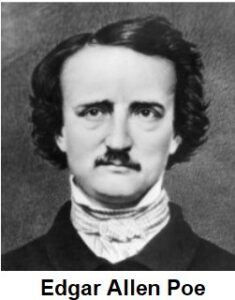Links to the mystery/crime books and stories covered in this section:
Books (all) Short Stories (all) Books (GEMs) Short Stories (GEMs)
 Commentary:
Commentary:
This section covers other authors in the mystery/crime genre besides the specific ones whose collected works are listed in their own section (Agatha Christie, Arthur Conan Doyle, Erle Stanley Gardner and James Hadley Chase).
Foremost among these other authors is Edgar Allan Poe, who single-handedly invented the mystery/detective genre with his story The Murders in the Rue Morgue, published in 1841. This short story includes all the essential elements of the modern detective story: the brilliant detective, his personal friend who serves as narrator, and the detailed reasoning leading up to final revelation. Poe even coined a new term for the science of deductive reasoning: “ratiocination”. It is no exaggeration to say that Poe’s story forever changed the history of world literature from the time it was published.
Poe’s detective C. Auguste Dupin, along with his unnamed narrator friend, served as the template for many other mystery stories and detective/narrator pairs which came later (of whom the most famous are Sherlock Homes/Dr. Watson and Hercule Poirot/Captain Hastings). The first notable full-length detective novel based on Poe’s model was The Mystery of Orcival (in French) by Émile Gaboriau, published in 1867. The following year (1868) saw the publication of the first modern English detective novel The Moonstone, by Wilkie Collins. It is truly remarkable that the basic detective-story template has not changed much in the 150+ years since these two novels were published, which is a testament to the quality of these stories as well as to Poe’s genius.
A genre closely linked to the mystery novel is the crime novel, of which James Hadley Chase is a prime practitioner. The crime-novel genre started to become popular around the beginning of the 20th century, and a good example is The Four Just Men by Edgar Wallace. This type of novel often included the point of view of the criminals, with an unsentimental portrayal of crime, violence, and sex, sometimes to the point of romanticization. Many bestsellers today (such as the ones written by James Patterson) still use the same basic plot device of a serial killer or conspirator in an ongoing battle of wits with law enforcement.
There are a huge number of books in the mystery/crime genre which have been published in the 20th century and beyond, making it difficult to compile a list of reasonable size. Rather than make a comprehensive list, I have attempted to select a moderate number of books which I consider both notable and representative of this genre. The selection includes traditional mystery writers like G.K. Chesterton (author of many Father Brown short stories) and John Dickson Carr (who specialized in locked-room mysteries), as well as modern crime writers like Mario Puzo (who wrote the quintessential gangster novel The Godfather) and Dennis Lehane (many of whose crime novels have been made into hit films).
One final note. There is often overlap between the mystery/crime genre and the adventure/espionage genre, and sometimes a given book may not fit neatly into one category or the other. When such cases arise, I have used my judgment to assign a book to a particular category, though I may assign other books by the same author to the alternate category. (In a very small number of cases, I have also listed a book in two different categories.) I realize that this assignment could be subjective; however, I believe the vast majority of books covered here have been properly assigned to the correct category.
